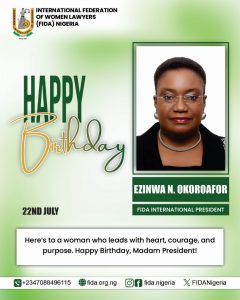Abuja, July 22, 2025 – In what is being described by legal analysts as a controversial and unprecedented judicial move, the High Court of the Federal Capital Territory (FCT) sitting in Abuja has relied on an apparently AI-generated and non-existent case law in its ruling on the suit Paulyn Abhulime SAN v. Zenith Bank Plc & Anor, delivered on July 16, 2025.
The case arose after the Claimant, Paulyn Abhulime, SAN, filed a writ of summons in 2024 seeking various reliefs against Zenith Bank Plc, alleging that the Bank breached its duty of care by freezing the account of her law firm, Abhulimen & Co., pursuant to an Order of the Magistrate Court sitting in Guruku, Nasarawa State.

The Claimant contended that the said Magistrate Court lacked the jurisdiction to issue such an order, and therefore, Zenith Bank ought not to have complied with it.

In its defence, the 1st Defendant, Zenith Bank, maintained that it acted in line with its legal obligation to comply with all court orders, irrespective of their perceived legality or jurisdictional competence. This defence reflected the well-established legal principle that all court orders, even those later found to be invalid, must be obeyed until set aside by a superior court.
However, the FCT High Court, while acknowledging this long-standing doctrine, departed from the traditional position. The Court relied on the reported decision in the case of FIRST BANK OF NIGERIA PLC v. ONUOHA (2017) LPELR-42135(CA) in reaching its verdict.
According to the Court, the cited authority suggests that a bank could be held liable for obeying a court order made without jurisdiction—thus holding Zenith Bank responsible for breaching its duty of care to the Claimant.
Alarming Discovery: AI Hallucination in Judgment?
This citation quickly sparked discussions within legal circles, as it contradicted entrenched principles of law. Legal researchers and commentators who attempted to access the case on LawPavilion, a premier Nigerian legal research platform, found that no such case exists under the reported citation.

Instead, the citation (2017) LPELR-42135(CA) corresponds to an entirely different case: CHIRONGO & ORS v. NADUKKU, which does not address issues related to banks or freezing of accounts.
This has led to the conclusion that the Court may have relied on a hallucinated case law generated by artificial intelligence, potentially sourced from online forums or summaries without verification from a legitimate legal database.
This event marks a critical moment for the Nigerian legal system, as it raises serious concerns about the infiltration of AI-generated misinformation into judicial reasoning, the integrity of legal research processes, and the potential miscarriage of justice where phantom legal authorities are inadvertently accepted as precedent.
What Next?
The judgment has ignited a call for stricter verification protocols in legal pleadings and judicial research, especially with the increasing use of AI tools by lawyers and judges. It also highlights the need for Nigeria’s judiciary to strengthen reliance on authentic, verifiable sources such as official law reports and legal databases like LawPavilion and Legalpedia.
Observers await possible appeals and further clarification on the implications of this ruling on the legal doctrine surrounding obedience to court orders, particularly those issued by lower courts.
Stay with us as we continue to monitor developments on this evolving judicial matter.
Find attached the judgement:
FCT High Court Relies on AI-Generated Case Law in Landmark Judgment









